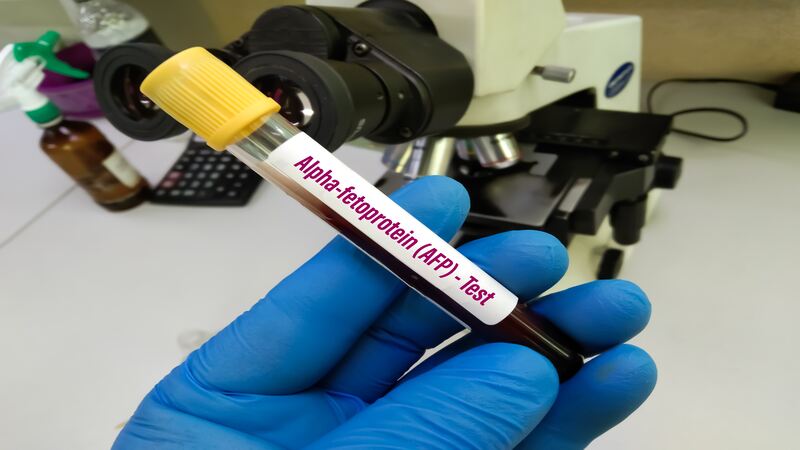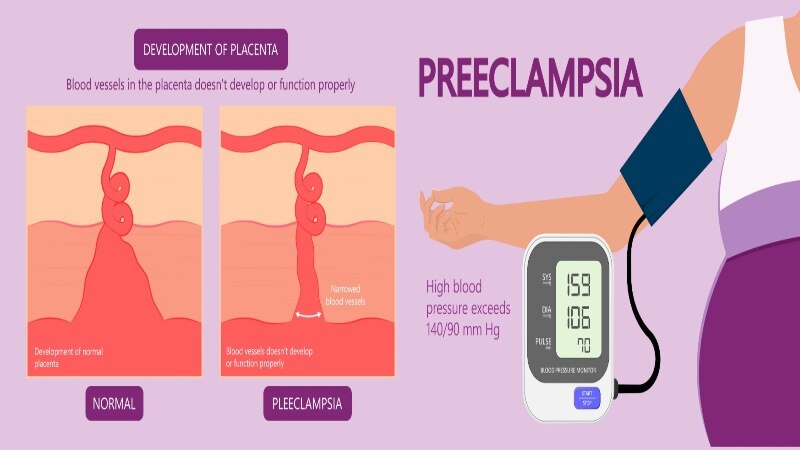
Pregnancy is a physiological phenomenon but proper monitoring throughout the pregnancy is needed in each trimester of pregnancy. The screening tests that need to be done in the mid-trimester are for chromosomal abnormalities and neural tube defects (NTDs). AFP levels need to be measured between 15 to 20 weeks of gestation for the identification of neural Tube defects.
Though, AFP monitoring used to be done regularly with recent advancements and widespread use of ultrasound in modern times throughout pregnancy. In this article, we will cover everything about the AFP test, its benefits and risks.
What is an Alpha-Fetoprotein (AFP) Test?
AFP or alpha-fetoprotein (AFP) test is a blood test recommended for pregnant women. Most healthcare providers use the AFP test to check a fetus’s risks of birth defects or genetic conditions. The AFP test measures alpha-fetoprotein levels. Alpha-fetoprotein is a protein that develops in the liver of a fetus. There are also other organs of the fetus where AFP is found (1)
Is an AFP Test Safe During Pregnancy?
AFP is tested in a very simple and non-invasive procedure. The blood is taken from the mother’s arm and the sample is then sent for testing. So, generally, neither for the mother nor for the fetus it causes any harm. Only the mother might feel slight pain since a small prick Is made on the mother’s arm for taking the blood sample. Other than that there is no imminent harm.
What is Alpha-Fetoprotein (AFP) Test Used For?

As discussed above, the AFP test Is a blood test that is used to detect:
- Neural tube defect
- Ventral wall defects
- Down’s syndrome
After performing the AFP test, it is cross-examined with the normal range. If it is found to be in the abnormal range then, more testing which can be both invasive and non-invasive is needed to be done which is confirmatory.
When Do You Need To Take The AFP Test?
AFP concentration is at its highest level of 3,000,000 ng/mL between 10–12 weeks of gestation, which steeply decreases to approximately 20,000 ng/mL until term in fetal serum. Certain academic societies of Obstetrics and Gynecology proposed in 2003 that between 15 to 20 weeks pregnant women undergo AFP screening tests. The level of AFP was found to be normal if it is 2.5 MoM and according to this range it is seen that the AFP test can detect approximately 90 to 95% of anencephaly and 60 to 80% open NTD.(2)
What Happens During The AFP Test?

The AFP test Is done by a very simple method. Healthcare workers like doctors, lab technicians, ASHA workers, nurses, etc. are appointed to collect the blood sample from the mother’s arm and the sample is to be collected in a medicated vial and sent to the laboratory for testing. This procedure is generally painless.
Benefits Of Alpha-Fetoprotein (AFP) Test
Alpha-fetoprotein (AFP) is a protein produced by the liver and yolk sac of a fetus. AFP has no normal function in adults. The test does not diagnose any health conditions but helps in understanding the fetal growth and development. Its benfits are lited below –
- AFP test helps to measure, diagnose, or monitor fetal distress or fetal abnormalities.
- The blood test helps to check the baby’s risk of birth defects and genetic disorders, such as neural tube defects like Spina Bifida or Anencephaly.
- Can detect genetic disorders like Down syndrome or Turner Syndrome
- Helps to detect incorrect due dates.
- Find multiple pregnancies like twins or triplets.
[Read : What Causes Anencephaly During Pregnancy?]
Risks Of Alpha-Fetoprotein (AFP) Test

There are no possible risks noted during the AFP tests since it is checked from the maternal serum taken from the mother’s blood (3). However, the mother might feel a sting while collecting the blood from the arm.
How To Interpret AFP Test Results?
AFP is done between 15 to 20 weeks of gestation. It is measured in nanograms per milliliter and reported as multiples of median ( MoM). AFP in a nonpregnant state is approximately 0.2 ng/mL, it is approximately 5 ng/mL at 10 to 12 weeks of gestation and increases until 30 to 32 weeks of gestation, and gradually decreases until term (4). The presence of AFP in amniotic fluid is approximately 1/150th–1/200th in fetal plasma, and the concentration in maternal serum is 1/100th in amniotic fluid.
Low Levels of AFP means that the fetus might have Down syndrome (Trisomy 21) or Edwards syndrome (Trisomy 18). Both of these conditions are considered as chromosomal abnormalities (7). Whereas, High levels of AFP mean that the fetus may have a neural tube defect or abdominal wall defect. Neural tube defects are birth defects where the fetus’ brain or spine does not develop properly. Spina bifida and anencephaly are two types of neural tube defects. Birth defects that affect abdominal wall formation are omphalocele and gastroschisis (8).
What Are Normal AFP Levels?
The normal concentration gradient between fetal plasma and maternal Serum is 50,000:1.
Normal AFP is 2.0 or 2.5 MoM as the upper limit.
Causes of High AFP Levels In Pregnancy?

Various potential factors change levels of AFP including factors that increase and decrease AFP levels (5)
The factors which increase AFP concentration are listed below:
- Multifetal gestation
- Fetal death
- Neural tube defect
- Omphalocele
- Cystic hygroma
- Gastroschisis
- Osteogenesis imperfecta
- Pre-eclampsia
- Oligohydramnios
- Fetal growth restriction
- Placental abruption
- Intestinal obstruction
- Renal anomalies
- Congenital skin abnormalities
- Liver necrosis
- Underestimated gestation
There are certain factors responsible for the decrease in levels of AFP. They are:
- Obesity
- Diabetes mellitus
- Trisomy 21 or 18
- Gestational trophoblastic disease
- Overestimated gestation
FAQ’s
1. What If Alpha-Fetoprotein Is High In Pregnancy?
If AFP test results show that the levels are high then it shows there might be any genetic abnormality of the fetus like neural tube defects. If that is the case, then further testing Is needed and the healthcare professional should advise the patient of chorionic villus sampling or amniocentesis for confirmation (6).
2. What Is A Positive AFP Result?
AFP is measured between 15 to 20 weeks of gestation. Normal AFP is between 2.0 to 2.5 MoM. If the AFP levels are more than 2.5 then it is considered abnormal, and further testing via amniocentesis or chorionic villus sampling is done for confirmatory results.
References
- Seppälä, Markku and Ruoslahti, Erkki. “Alpha fetoprotein: Physiology and pathology during pregnancy and application to antenatal diagnosis” Journal of Perinatal Medicine –https://www.degruyter.com/d
- Kim GJ, Seong JS, Oh JA. Prenatal screening for neural tube defects: from maternal serum alpha-fetoprotein to ultrasonography, 2023 Jan –https://www.ncbi.nlm.nih.gov/pmc/articles/PMC9849725/
- Mizejewski GJ. Levels of alpha-fetoprotein during pregnancy and early infancy in normal and disease states. Obstetrical & Gynecological Survey. 2003 – https://europepmc.org/article/med/14668662
- Waller DK, Lustig LS, Smith AH, Hook EB. Alpha-fetoprotein: a biomarker for pregnancy outcome – https://pubmed.ncbi.nlm.nih.gov/7691189/
- Tyra G Krause, Peter Christens, Jan Wohlfahrt, Ulrikke Lei, Tine Westergaard, Bent Nørgaard-Pedersen, Mads Melbye, Second-trimester maternal serum alpha-fetoprotein and risk of adverse pregnancy outcome, 2001,- https://www.sciencedirect.com/
- Mizejewski GJ. Physiology of Alpha-Fetoprotein as a Biomarker for Perinatal Distress: Relevance to Adverse Pregnancy Outcome. Experimental Biology and Medicine – https://journals.sagepub.com/
- University of Rochester,Medical Center, Alpha-Fetoprotein (Maternal Blood) – https://www.urmc.rochester.edu/encyclopedia/
- Stanford Medicine, Alpha-fetoprotein (AFP) Screening Test – https://www.stanfordchildrens.org/en/topic/
Read Also: What Is An Anomaly Scan?
